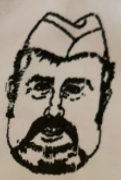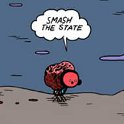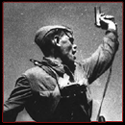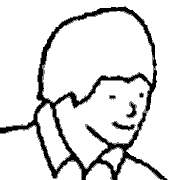|
After a week or so of playing, was getting kinda anxious about learning bass clef since the video game stuff I have has it. Skipped a bunch of lessons in the newbie book hoping to find a lesson for it, but it's never mentioned  Apparently their idea is to put the letter of chords above the treble clef and that's all ya need to know. Insufficient for what I need obviously. I need a real book :/ Also, the 3-pedal board...only the right (sustain) pedal seems to do anything. Granted, I don't even know what the other two are supposed to do, but I tried figuring it out, and nothing seemed to changed when I used the other two no matter what I did. Hoping the p95 actually supports the other two pedals. If not, I might be selling it and getting the ydp (or better) sooner than I thought. Also noticing the keys don't always register for being pushed when the keys don't come all the way up from last push. Sensors could be better. So..yeah...it's the cheapy digital piano + package for sure. But I'm nowhere close to being good enough to judge a better piano so...whatevs. Good enough for now. edit: Would anyone recommend *NOT* getting "Alfred's Adult Piano Course Level one"? Seems to be pretty popular Also, amazon is doing a 4 for 3 deal where I can get 4 books for the price of 3. There are 3 Alfred books in the series, so if I bought all 3, I could get something else thrown in for free. Any recommendations? Eustacia fucked around with this message at 03:22 on Feb 5, 2012 |
|
|
|

|
| # ? Jun 13, 2024 07:07 |
|
Normally the far left pedal is the soft pedal - in a grand piano it shifts the hammers to one side so they only strike two of the three strings per note, which makes everything softer. In some it moves the hammers slightly closer to the strings for a similar effect. The middle pedal on a grand lets you sustain whatever notes where down when you put down the pedal while you play other notes. It's a bit like having an extra hand. I think on some uprights the middle pedal lowers a thing of felt between the hammers and keys to make it muted, and it's called the 'practice pedal'. I've never actually seen a thing of felt though, and I've opened up plenty of pianos. I would not be a bit surprised if the ones you have are just ornamental though. I believe I used Alfred when I was a kid, and I turned out ok...
|
|
|
|
^^^ That's what I get for typing slowly.Eustacia posted:After a week or so of playing, was getting kinda anxious about learning bass clef since the video game stuff I have has it. Skipped a bunch of lessons in the newbie book hoping to find a lesson for it, but it's never mentioned quote:Also, the 3-pedal board...only the right (sustain) pedal seems to do anything. Granted, I don't even know what the other two are supposed to do, but I tried figuring it out, and nothing seemed to changed when I used the other two no matter what I did. Hoping the p95 actually supports the other two pedals. If not, I might be selling it and getting the ydp (or better) sooner than I thought. The middle pedal works differently on uprights and grands, and I'm not sure what your keyboard does with it. On an upright, it lifts the dampers on the lower half of the piano, so bass notes sustain but upper notes play like normal. On grands, you use the pedal AFTER playing some notes, and those notes will sustain while the rest of the notes play like normal. I don't think anyone uses it very often.
|
|
|
|
Cools. They work. Thanks for heads up. I'd've never experimentally figured out the middle pedal, but it works and I can already see some uses for it. Small window of time for it to work so that's gonna be tricky to use. Oh...it's the one where you push it after the key is already down and it sustains that note, but new notes don't sustain. The left pedal...technically it works, but it's very subtle, barely audible. Have to hit the keys really hard and it diminishes maybe the higher sharp parts of the noise. It's a really really miniscule change tho, and at normal volume I can't tell the difference at all. Are real piano damper pedals significant, or are they really this 2%, if that, change? Definitely leaning toward the Alfred book. There's a version with a plastic ring binding so it lays flat. And yeah, I want something with drills and stuff. The theory by itself won't do much for me. Eustacia fucked around with this message at 04:59 on Feb 5, 2012 |
|
|
|
Yeah, the una corda pedal is mostly a timbre change on a grand piano, so your digital probably tries to mimic that. Sostenuto pedal is (as I understand it) mostly for playing crazy Russian-type stuff with a big long bass note and fast high runs. I am a middling to crap piano player and I don't think I've ever seen a piece that uses a pedal other than the sustain pedal. It's really very rare. What's the fourth pedal on the grand piano? Practice pedal?
|
|
|
|
Eustacia posted:Definitely leaning toward the Alfred book. There's a version with a plastic ring binding so it lays flat. And yeah, I want something with drills and stuff. The theory by itself won't do much for me. I got the Alfred book a few days ago, it looks good from my brief flicks through it and it has a couple of pages on the bass clef.
|
|
|
|
The fourth pedal is only on a very few grands. I've never seen one. According to Wikipedia, the fourth pedal in a grand moves the hammers closer to the strings like the third pedal on the upright. I have used the middle pedal exactly once, at the end of a fugue, can't remember which one now though. It's definitely for those times when you're like, "was this written for a three handed mutant or what". I'm working on Ravel's "Ondine" right now, which pretty much uses the soft pedal the entire time.
|
|
|
|
Hawkgirl posted:Yeah, the una corda pedal is mostly a timbre change on a grand piano, so your digital probably tries to mimic that. In case you're confused why the left pedal is both a "soft pedal" and a timbre change... pianos work via felt hammers hitting a bunch of strings. Over time, the parts of the felt that keep hitting the strings compress and thus get harder. As people have said, on a grand piano the soft/una corda pedal shifts all of the hammers so that the hammers only hit 1-2 strings instead of 2-3, which helps it play quieter. But if you hold that pedal partway down, then the hammers only shift partway, so you get the softer (less compressed) parts of the hammer hitting the strings, so you get a softer, less harsh sound out of it. I've kind of gotten into the habit of pressing the soft pedal halfway down whenever I'm on a grand piano. It's probably a crutch to developing better touch, but oh well, at least it sounds better!
|
|
|
|
Has anyone ever gotten to the point where they realize more and more how much their playing sucks, and they just want to stop playing what they are playing? It seems to be related to progress. In my case it's gotten to the point where I refuse to even play what I am (or was) working on because I just can't stand the frustration of it sounding that bad. I guess it's the downside of having a good ear. I am making progress, but progress for me mostly reveals how inadequate my music sounds. I guess it's better to be aware of this then be ignorant. I think I've probably tried to leapfrog too far in my repertoire and shouldn't be playing the things I am currently playing. So now I'm not even going to try to play anything but level one stuff and 12-bar blues stuff for awhile and make it sound as good as possible. I need to avoid taking shortcuts and trying to be at a level technically that I'm not. It feels like the right thing to do but I'm sure someone disagrees  And yes, I am a hardcore perfectionist - I can't stand the sound of even note flubbed or too soft or too loud. I guess if my stuff doesn't sound like Van Cliburn I get raged ^_^
|
|
|
|
Does anybody have experience with cleaning the bass strings of a piano? I got a sweet deal on a 1930s Chickering and Sons grand, and I've had it voiced and regulated, and everything is great about it, but the bass strings are dull (both in color and sound). My plan would be to remove them one at a time, soak in a bucket of water and something else (whatever it is that cleans copper), and then dry. My concern would be that the solution would soak in under the copper winding and cause issues if it didn't dry. I've tried finding prices for replacement strings, but it's so piano-specific that nobody lists prices. I guess I could ask the guy who regulated it.
|
|
|
|
Erwin posted:Does anybody have experience with cleaning the bass strings of a piano? I got a sweet deal on a 1930s Chickering and Sons grand, and I've had it voiced and regulated, and everything is great about it, but the bass strings are dull (both in color and sound). I wouldn't take them out unless it's really drastic, it's a pain in the goddamn rear end to get them back in right and re-tuned and all that. When I get home from work today I'll look into it, it's in my tuners manual somewhere. Replacement strings can be quite expensive, depending. You can buy a roll of wound wire and make it the right length yourself by cutting and unwinding the copper, or you can get strings precisely duplicated but that's like $20/string or more. Or you can buy whole sets of strings that might be close to right for a few hundred.
|
|
|
|
Bob Shadycharacter posted:I wouldn't take them out unless it's really drastic, it's a pain in the goddamn rear end to get them back in right and re-tuned and all that. I don't mind this so much (although maybe after the first one I'll change my mind). Re-tuning it is not a problem, but maybe fiddling off and back on the hitch and bridge pins will make me hate myself. When the guy regulated the piano, he loosened one of them and twisted it a few times at the hitch pin, then put it back on. It broke some of the crust off and it definitely sounds better, but it's still pretty dark looking. Maybe I'll just do that for the rest of them and see if that's enough.
|
|
|
|
CowOnCrack posted:Has anyone ever gotten to the point where they realize more and more how much their playing sucks, and they just want to stop playing what they are playing? It seems to be related to progress. In my case it's gotten to the point where I refuse to even play what I am (or was) working on because I just can't stand the frustration of it sounding that bad. Yep, I hear ya, buddy. It's why I actually stopped playing, sadly. Every once in awhile I'd get the itch to start again, then I hit the perfectionism and frustration stage (not to mention that I sound even worse than I did before because I hadn't touched a piano in so long) and remember why I stopped. I've made peace with listening to others play. It just isn't enjoyable for me to actually play anything anymore.
|
|
|
|
facepalmolive posted:Yep, I hear ya, buddy. It's why I actually stopped playing, sadly. Every once in awhile I'd get the itch to start again, then I hit the perfectionism and frustration stage (not to mention that I sound even worse than I did before because I hadn't touched a piano in so long) and remember why I stopped. Thanks for the honesty, it's not easy to give something like piano up. Frustration in some cases is a motivator, but if playing is all frustration and no reward then it becomes harder and harder to continue playing. In most things I do (various hobbies) I run into that frustration / perfectionism deal and often quit. To be honest I wonder if most successful pianists are actually obsessive perfectionists. I used to think obsession with perfection and constant frustration were positive traits to have, but now I'm not so sure, because more than one hobby for me was crushed by this. A lot of good piano players I meet are almost the opposite in personality. I what Hamelin's relationship to his craft is. He definitely seems at ease with it, whether or not it's because it's so easy for him.  My hope is that I can develop a better relationship with playing by tackling things that I can handle so I can get that sense of accomplishment that comes with doing something correctly. In a way, this almost requires you to be 'dumb' about it - i.e., don't get into that mode where you are like "ok nice job on this easy piece, but actually you still suck." Ha ha.
|
|
|
|
Erwin posted:Does anybody have experience with cleaning the bass strings of a piano? I got a sweet deal on a 1930s Chickering and Sons grand, and I've had it voiced and regulated, and everything is great about it, but the bass strings are dull (both in color and sound). I recently did a big repair on an upright piano. I dunno about cleaning them, but my recollection from the books I read was that it's not a good idea to remove and reinstall strings, although I do vaguely recall mention of cleaning strings. It'll make them sound better. I'm not sure the best way, though. Maybe without removing them. The main book I used may have info on this: http://www.amazon.com/Piano-Servicing-Tuning-Rebuilding-Professional/dp/1879511037/ref=sr_1_1?ie=UTF8&qid=1328660698&sr=8-1 But I just replaced all mine. You have to have bass strings custom wound, as far as I know. I took my old ones off and sent them to this place in Tennessee to be duplicated: http://www.mapeswire.com/pianostring.htm I think it cost between $200 and 300. This didn't seem too bad to me in the grand (sorry, upright) scheme. Having taken a piano fully apart, I now regard them as being on the level of automobiles in complexity and expense, as regards their repairs and parts. They are not to be trifled with, unless you enjoy manual labor.
|
|
|
|
facepalmolive posted:I've kind of gotten into the habit of pressing the soft pedal halfway down whenever I'm on a grand piano. It's probably a crutch to developing better touch, but oh well, at least it sounds better!
|
|
|
|
CowOnCrack posted:Thanks for the honesty, it's not easy to give something like piano up. Frustration in some cases is a motivator, but if playing is all frustration and no reward then it becomes harder and harder to continue playing. I have a similar problem. Its so important to find something fun to do with an instrument that can sit along side the development perfectionism element. Be it jamming along to a backing track or other people or just playing fun songs that you don't care are perfect or not. Learning to separate the state of mind you have for Chopin and the one you have for bashing out show tunes or lady gaga or whatever the gently caress you just enjoy doing. I don't know if you play any other instruments but since I'm not really at the stage where I have a wide repertoire I find it good to swap when I start to get too frustrated with piano. As for just piano and learning something properly I tend to find it helps to take pride in what you can do. Recording helps for this, record yourself a lot and listen to it, learn to enjoy your progress it really helps to make the pain worthwhile. You're right about playing something within your range as well. It takes a certain person to sit and painstakingly go through something beyond them day after day after day after day making tiny progress every day. If you're not that person then don't do it, it saps the fun out of it. Breaking down the music you are working on helps as well. Really small chunks that you can play the poo poo out of over and over and over, seriously a 5 second loop you can play 20 time a minute or 1200 times an hour. Obviously most small sections wont need an hours intensive work. But by working on a small section over and over and over you really do get to know that small section incredibly well no matter how much of a perfectionist you are.
|
|
|
|
This newbie book is just plain bad. I'm learning, but it's got errors, and it doesn't teach fingering for chords. Been trying to figure out a good way to do them, and I get by, but there's really no way to play C7 or F7 chords with the fingering it teaches at the beginning of the book with fingers arched over the white keys beneath the black keys. I know someone in this thread was talking about a position where you arch the fingers between the black keys...it's tight tho. Not sure how someone with fat fingers could play in that position. Basically stumped how to play these 4-chords, especially quickly. And why does the C7 chord add the Bflat above the C chord, but the F7 chord sticks the A down an octave after adding the Eflat in the middle of the F chord? Seems random. :/ I can play 3-note bass chords in harmony with the treble melody pretty well tho. Having an easier time learning chords on my left hand even, despite being right handed. The Alfred books need to hurry up and get here. edit: Yay they arrived 3 days early. edit2: Book brings up bass clef on page 16, grand staff by 20. Versus the other book that didn't have either. It's soo much better. Eustacia fucked around with this message at 00:39 on Feb 11, 2012 |
|
|
|
Eustacia posted:This newbie book is just plain bad. I'm learning, but it's got errors, and it doesn't teach fingering for chords. Been trying to figure out a good way to do them, and I get by, but there's really no way to play C7 or F7 chords with the fingering it teaches at the beginning of the book with fingers arched over the white keys beneath the black keys. I am not sure what the exact fingerings are for most seventh chords, but for C7 I use 1234 or 1235 for the right hand. They definitely aren't easy to play. I recommend trying G7 first, since it is the most common progression from C and is all white keys. G7 is GBDF, and is played with 1245 right hand or 5321 for left hand. A great introduction to seventh chords is arpeggios since these teach you to stretch you fingers over a wide range. quote:I know someone in this thread was talking about a position where you arch the fingers between the black keys...it's tight tho. Not sure how someone with fat fingers could play in that position. I have fat fingers and it gets annoying sometimes. I arch my fingers and press down harder than normal to get the same sound, which is difficult. I have trouble on keyboards with lighter action (like my digital keyboard at home) because when I press down in between the keys it can sometimes push the black keys enough to make a flub. On pianos with good action and regulation, this is not usually a problem - the action is heavy enough that pushing the key from the side and down won't cause it to depress. quote:Basically stumped how to play these 4-chords, especially quickly. Playing 4-note chords quickly hopefully isn't a part of your repertoire at the moment - as far as I know that kind of stuff is pretty advanced. The way seventh chords are formed is related to music theory. There are many kinds of seventh chords, but the most important one is a dominant seventh chord. A dominant seventh chord consists of a root, a major third, a perfect 5th, and a minor seventh. A half step is the very next note on the keyboard, whether it's a black key or white key. Here are the relevant intervals: root - the base note of the chord major 3rd - 4 half-steps from the root perfect 5th - 7 half-steps from the root minor 7th - 10 half-steps from the root The minor seventh explains the B flat in a C7 chord. Also, in music, the 4th and 5th notes of a scale are some of the most important for harmony. The 5th note of the C Major scale is G, so a seventh chord with G as the root would be a G7 chord and would be very useful for chord progressions in C Major. For whatever mathematical reason, going from C Major to G7 and then back is a harmonious progression. G7 as mentioned would be G, B, D, and F which is the root G, a major 3rd, a perfect 5th, and a minor 7th. quote:I can play 3-note bass chords in harmony with the treble melody pretty well tho. Having an easier time learning chords on my left hand even, despite being right handed. Definitely learn triads before messing with sevenths. A lot of seventh chords are simplified into triads to make chord progressions easier. For example, G7 is often played as B, F, and G - a triad that is easy to play before and after the C Major triad of C E G. The fingering for B F G would be 521 for the LH and 145 for the RH. It is basically the notes of G7, GBDF, re-arranged, omitting the D, and sounds similar so works well for chord progressions. edit: woops, fingerings needed to be changed CowOnCrack fucked around with this message at 01:55 on Feb 12, 2012 |
|
|
|
Eustacia posted:Also noticing the keys don't always register for being pushed when the keys don't come all the way up from last push. Sensors could be better. I believe that is simulating the actual mechanism of a real piano - the key has to come up a distance before the escapement re-engages, and the hammer is ready to go again. I could be wrong though.
|
|
|
|
Hey guys, so I picked up piano a little while ago to further my production abilities as a musician, but at this point I'm looking for a teacher to take it to the next level. I've been playing guitar for 8 years and taught at the highschool level for one of those, but I was completely self taught for that. I feel piano is different in that regard though because I want to be able to play and produce some more complicated jazz/neo-soul esque pieces. Do you guys have anything you specifically look for when looking for a piano teacher? I'm in San Francisco, and google hasn't brought up much as far as the best option. Every time I read about my favorite musicians in those genres to see where they learned, it's ALWAYS at their church. Like an honest 90% of the biographies I've come across. Any opinions/advice on how to get the best knowledge for the buck?
|
|
|
|
SVU Fan posted:Hey guys, so I picked up piano a little while ago to further my production abilities as a musician, but at this point I'm looking for a teacher to take it to the next level. The best advice I can give is find someone who will compliment what you already know and don't know. Since you already have a great deal of music experience, look for a teacher that compliments your weaknesses. Also, look for a teacher that specializes in your interests. Since composition is one you might look for a teacher that either is a composer or teaches compositional elements. Since you mentioned that you are interested in jazz/neo-soul esque pieces, try to find a jazz pianist, etc. This is very important, because not all teachers are the same and you will waste time and money with a teacher that doesn't offer something. For myself I found a local teacher who is a composer and is helping me a lot with music theory and musicality, which is a great fit for me because up to that point I had been tackling pieces of increasing technical difficulty with little thought to how musical I was making it or how the music behind the notes really worked. I could barely sight read in fact. It was a lot of work and pretty painful, but now I have enough theory knowledge to analyze and break down almost any piece and learn it very quickly. Good luck.
|
|
|
|
Looking for some advice aswell, mainly on some new pieces to play. I feel I am getting past the beginner stage now, I can play with two hands quite well and have learnt a lot of theory. I am getting through my scales/arpeggios etc trying to learn things the 'right' way, my problem is I sit down at the piano for a couple hours and for half of that I just sorta improvise, making up tunes etc, kinda like doodling on the piano if that makes sense. This is ok but I really need some new pieces to learn that are at my skill level that I will stick at. I love sorta melancholy, nostalgic piano music so if anyone has any suggestions that would be great. My knowledge of piano music beyond the obvious stuff is pretty poor.
|
|
|
|
I haven't played piano seriously in about 15 years, though I was decent for my age when I stopped and I play other instruments. I started up again a few weeks ago, and it's starting to come back some; doing some Burgmüller études (Op. 100) and getting back into the swing of things now, to give some idea of where I am at the moment. Is there any intermediate-repertoire Brahms? I know some composers I like but generally I've found it hard to identify pieces that are level-appropriate for me. I played a Kabalevsky Toccatina (A minor) and liked it and went out to my music shop and bought the only Kabalevsky book they had available, and boy howdy I should have looked inside it first because it is for six year olds.
|
|
|
|
Angrycel posted:Looking for some advice aswell, mainly on some new pieces to play. I feel I am getting past the beginner stage now, I can play with two hands quite well and have learnt a lot of theory. I am getting through my scales/arpeggios etc trying to learn things the 'right' way, my problem is I sit down at the piano for a couple hours and for half of that I just sorta improvise, making up tunes etc, kinda like doodling on the piano if that makes sense. This is ok but I really need some new pieces to learn that are at my skill level that I will stick at. I love sorta melancholy, nostalgic piano music so if anyone has any suggestions that would be great. My knowledge of piano music beyond the obvious stuff is pretty poor. I don't know if it's too hard for you, it sounds simple but the left hand could be challenging for someone who is quite new to piano. Still, practice a lot and it's a nice and easy piece. I also like that its repetitive nature means you can learn to play it roughly very quickly
|
|
|
|
Angrycel posted:Looking for some advice aswell, mainly on some new pieces to play. I feel I am getting past the beginner stage now, I can play with two hands quite well and have learnt a lot of theory. I am getting through my scales/arpeggios etc trying to learn things the 'right' way, my problem is I sit down at the piano for a couple hours and for half of that I just sorta improvise, making up tunes etc, kinda like doodling on the piano if that makes sense. This is ok but I really need some new pieces to learn that are at my skill level that I will stick at. I love sorta melancholy, nostalgic piano music so if anyone has any suggestions that would be great. My knowledge of piano music beyond the obvious stuff is pretty poor. I'm curious, are you playing with a metronome, counting out loud, etc.? If you feel relatively confident with scales and arpeggios, you might take a look at Czerny and Hanon (as well as keeping up scales and arpeggios) for warm-up and technique. For actual pieces, Bach's two and three part inventions are great beginner pieces, and Chopin's Nocturnes might be approachable if you take them slowly. Same with Mendelssohn's Songs Without Words. Additionally, check out Chang's Fundamentals of Piano Practice, if you haven't already. Wonderfully detailed text that covers a host of things to do with practicing well.
|
|
|
|
guppy posted:Is there any intermediate-repertoire Brahms? Some of his waltzes are pretty accessible. There's also various intermezzi and ballades that aren't too tough but sound great, or the G minor rhapsody. IMSLP's got quite a few of them.
|
|
|
|
Thanks, I will check them out.
|
|
|
|
Kolodny posted:I'm curious, are you playing with a metronome, counting out loud, etc.? If you feel relatively confident with scales and arpeggios, you might take a look at Czerny and Hanon (as well as keeping up scales and arpeggios) for warm-up and technique. For actual pieces, Bach's two and three part inventions are great beginner pieces, and Chopin's Nocturnes might be approachable if you take them slowly. Same with Mendelssohn's Songs Without Words. Thanks for this, exactly what I need. Really need to structure my practice/playing a lot more. I am playing with a metronome most of the time, just get too easily sidetracked!
|
|
|
|
Can anyone recommend a beginner/intermediate jazz piano book that's not a piece of poo poo besides the Real Book? I've been working through the vince guaraldi Charlie Brown Christmas book for the past 4 months or so. I'm pretty solid at a good number of the pieces, but I feel like I will go insane if I sit down and play "Christmastime Is Here" one more time. edit: I bought this book with my keyboard a year ago because it seemed like the best one in the store, but it turned out to be a total piece of poo poo: http://www.amazon.com/Blues-Jazz-Complete-Book-CDs/dp/0882849603 edit again: Whoops, just noticed that there's a big Jazz thread in this subforum. Going to look into Charles Beale's Jazz Piano From Scratch. Polo-Rican fucked around with this message at 20:47 on Feb 20, 2012 |
|
|
|
Polo-Rican posted:Can anyone recommend a beginner/intermediate jazz piano book that's not a piece of poo poo besides the Real Book? I've been working through the vince guaraldi Charlie Brown Christmas book for the past 4 months or so. I'm pretty solid at a good number of the pieces, but I feel like I will go insane if I sit down and play "Christmastime Is Here" one more time. I've made some decent progress with The Jazz Piano Book by Mark Levine, though it assumes access to a bunch of fake book material.
|
|
|
|
Any tips on playing polyrhythms? I'm learning Chopin's "Nocturne Op. 9, No 1 in B flat minor" and the various polyrhythmic parts are killing me (7/6 or 11/6). I can play both parts independently since they are relatively simple but as soon as I start to play them together...my right hand automatically matches the left and it all goes to poo poo.  Any tips, or just keep plugging away?
|
|
|
|
polyfractal posted:Any tips on playing polyrhythms? I'm learning Chopin's "Nocturne Op. 9, No 1 in B flat minor" and the various polyrhythmic parts are killing me (7/6 or 11/6). There's a measure in the piece I'm working on right now that has 7/6, 6/7, 6/5, 5/7 - all in one measure. Drives me nuts but it sounds nice. Focus on getting the first two notes of each beat together and the first two notes of the next beat (or part of a beat) together. And just try not to think too hard about where every note falls in-between.
|
|
|
|
polyfractal posted:Any tips on playing polyrhythms? I'm learning Chopin's "Nocturne Op. 9, No 1 in B flat minor" and the various polyrhythmic parts are killing me (7/6 or 11/6). I learned triplets by subdividing, but doing that with those kinds is very impractical. You might do it just to get a feel for it though. 7 against 6 is very similar to 6/6 except the left hand will come up just a bit short until you hit 42nd sixteenth, or 22nd 8th, or 11 1/2th quarter where they agree. 11 against 6 is close to 12/6, but with the left hand coming up just short until the 22nd quarter. I haven't been very successful in my attempts to learn these kinds of polyrythms yet (I took a stab at the Fanatasia-Impromptu 4/3 awhile back). It really is a mindbender, more than anything else I've encountered in music.
|
|
|
|
Having small hands sucks. I'm trying to learn Chopin's Prelude Op 28, No 15 (the raindrop one) and my left hand can't stretch far enough for a couple of the chords. I've been playing the highest notes with my right thumb but it's still annoying having to play around with different right hand fingerings.
|
|
|
|
Since I made this thread... and give out advice... but nobody knows if I can actually play the piano... Here's one of my pieces about 2 months away from performing at jury. Although I performed it last week and will again next week, this recording takes place before then. Some screw ups, but IT HAPPENS: 
|
|
|
|
really good, the only heard huge slipups at the very hard parts but that's what the 2 months are for right? only thing is that in the beginning section some of the rolled chords there don't sound smooth enough. of course i'm basing that on having heard the piece a ton of times, but i'm not even close to touching the score for another couple years.
|
|
|
|
Nice I enjoyed the listen. I look forward to hearing it after two more months.
|
|
|
|
Great job on the Ballade! It's probably my favorite of the four. I agree with Ian that the rolled chords with the grace note could be a little smoother. Also, in the two stretto sections of the 2nd Andantino passage, it has an eighth rest after it does that ascending pattern, before it comes down in fortissimo. It feels like you're holding the eighth notes before it a bit too long; almost as if they had fermatas over them. A shorter pause might be alright, but it seems a bit noticeable as is. Apart from that, most of the things I'd change are more due to interpretation I'd prefer than anything objective. Along those lines, I think the Presto sections could go faster, and the left hand sixteenth notes could maybe be a little clearer. I was also thinking the phrasing could be brought out even more in the Andantino passages, but after listening to some different recordings I'm not as sure. I think you really did justice to the Coda section where it switches to A minor; I love that part so much, and it sounded excellent.
|
|
|
|

|
| # ? Jun 13, 2024 07:07 |
|
Thanks =) Yeah, my teacher is always on me about the grace notes. I'd like to have the Presto Coda faster, but my fingers don't want to play any faster!  I'll try to record it again in April, it might be a lot better or a little bit better or the same though haha, as I have 3 other pieces I have to prepare as well that aren't at performance level yet.
|
|
|























